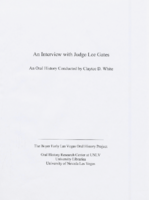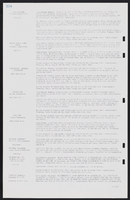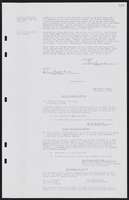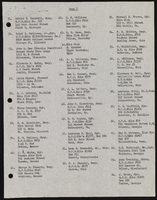Search the Special Collections and Archives Portal
Search Results

Transcript of interview with Ruby Amie-Pilot by Barbara Tabach and Claytee White, August 7, 2012
Date
Archival Collection
Description
Ruby Amie-Pilot moved to Las Vegas in 1952. She worked at the Desert Inn in the kitchen, was the first African American full time sales person at Sears; she also worked as a window dresser with Hazel Gay, and later owned travel agency with Esther Langston. In the interview, Ruby discusses moving to the Westside, Jackson street and housing developments, education, and her experiences with local leaders.
Text
Wright, Johnie B.
Johnie Beatrice Sparkman Wright was born on June 8, 1939 in McNary, Arizona. She moved to Las Vegas, Nevada in 1941. Johnie is a retired nurse's aide who received her training at Rose De Lima Hospital in 1968. As a native Las Vegan she recalls stories of her youth: Brownies, dancing at Silver Slipper and not being allowed on Jackson Street. She remembers moving to Berkley Square in 1959 and what it was like to live there.
Person
Harris, Asalee, 1933-
Asalee Harris was born in Fortune Fork, a little place outside of Tallulah, Louisiana, on the road to Vicksburg, Mississippi. A family of sharecroppers, the cotton farming was arduous and eventually they moved to Tallulah. She married and her husband's brothers lived in Las Vegas so in 1954 Asalee and James joined them.
Person
Gates, Lee
Judge Lee Gates was born in Louisiana in the 1940s, but moved to Las Vegas, Nevada in 1960 with his father. His mother had moved there earlier, gotten a job, and established a home in the historical Westside neighborhood of Las Vegas. He was a student at the University of Nevada, Las Vegas, where he was a member of the Black Student Association and studied under professor Roosevelt Fitzgerald, who raised his awareness of black history. Gates participated in the civil rights movement and worked as a lawyer before becoming a judge.
Person

Transcript of interview with Judge Lee Gates by Claytee D. White, December 5, 1996
Date
Archival Collection
Description
Interview with Judge Lee Gates conducted by Claytee D. White on December 5, 1996. Born in Louisiana, Gates moved to Las Vegas around 1960. Following high school, he attended UNLV, where he was a member of the Black Student Association and studied under professor Roosevelt Fitzgerald, who raised his awareness of black history. Gates participated in the civil rights movement and worked as a lawyer before becoming a judge. He discusses Jackson Street, Dr. Charles West, attorney Charles Kellar, and his own involvement with Ruby Duncan's group.
Text





